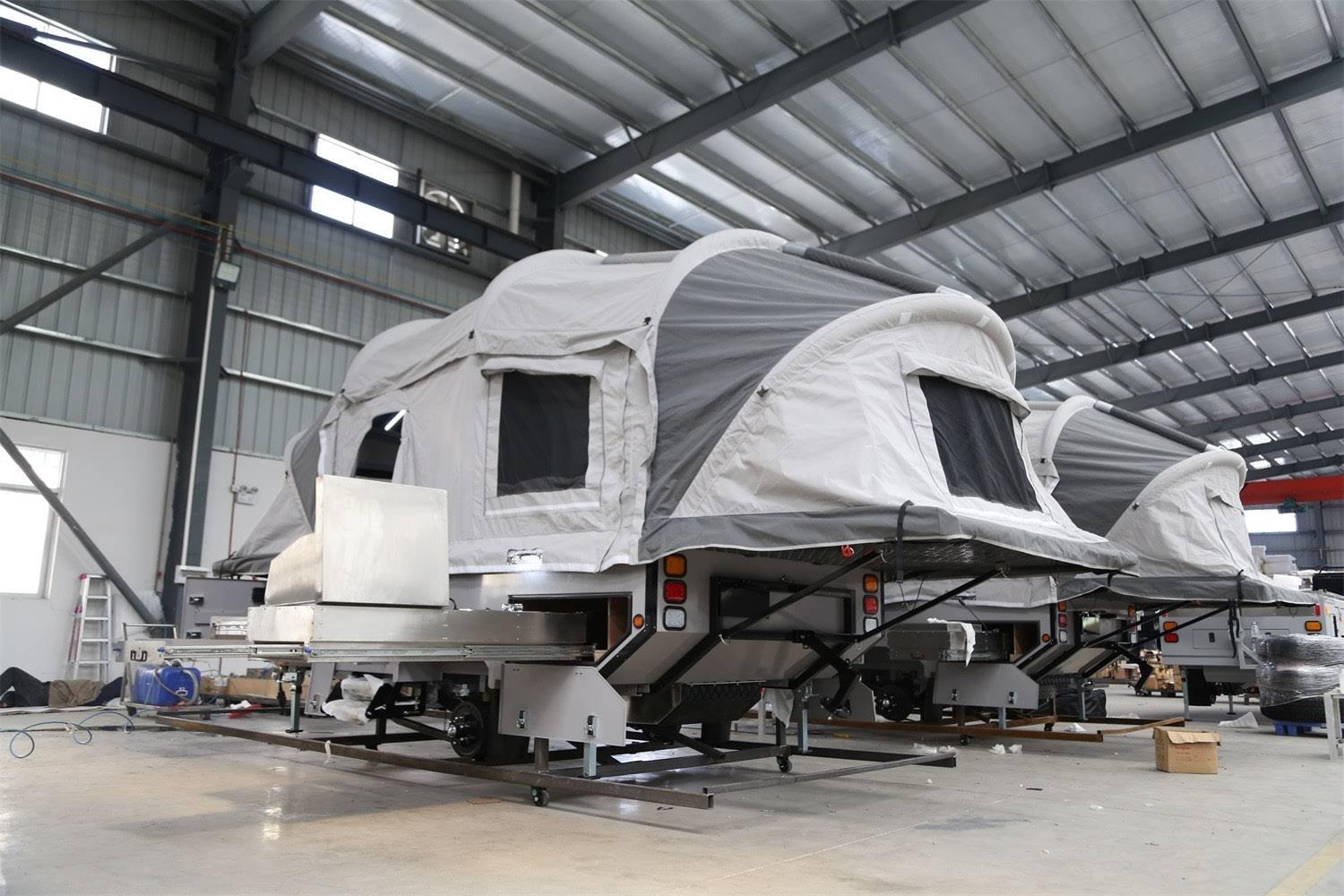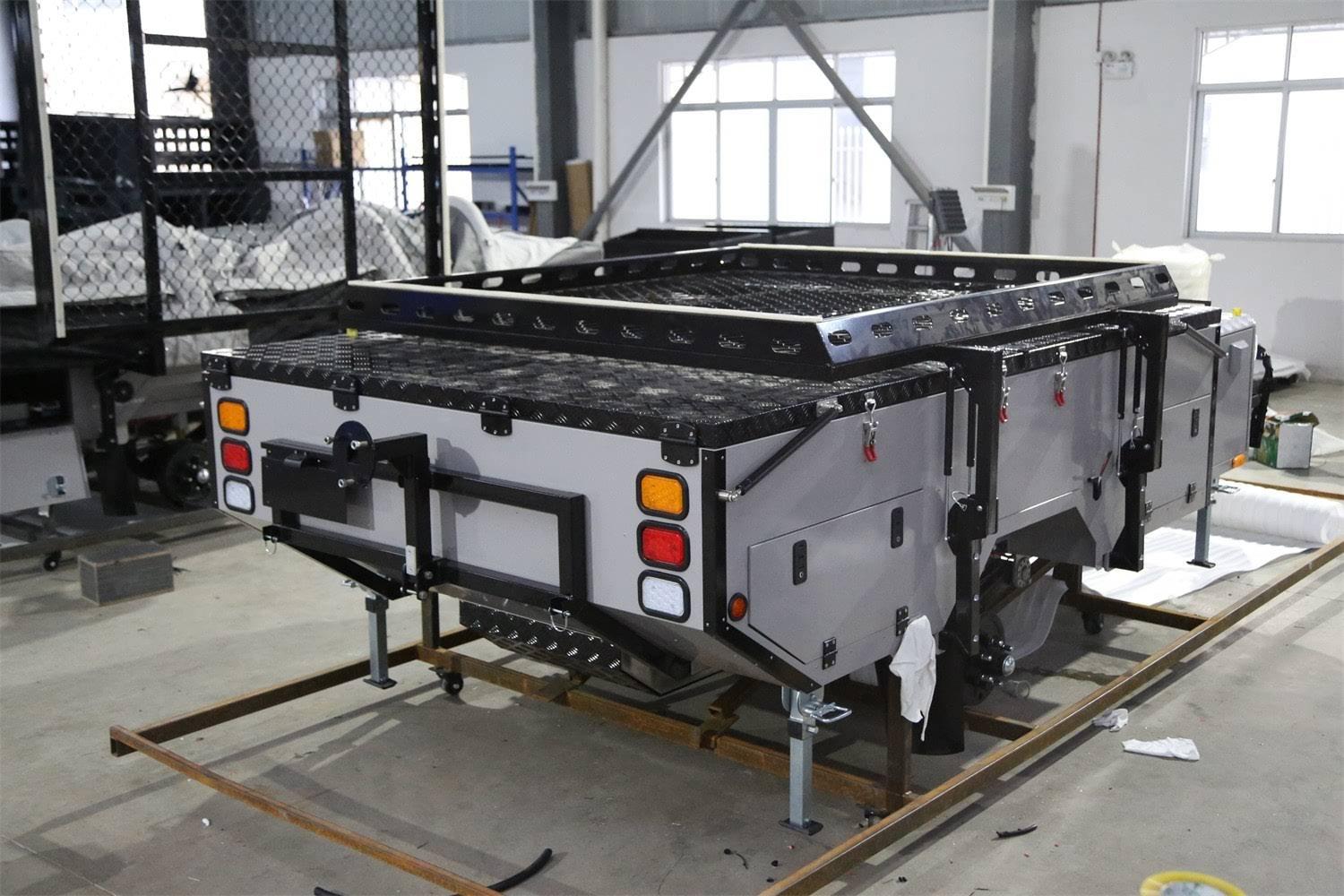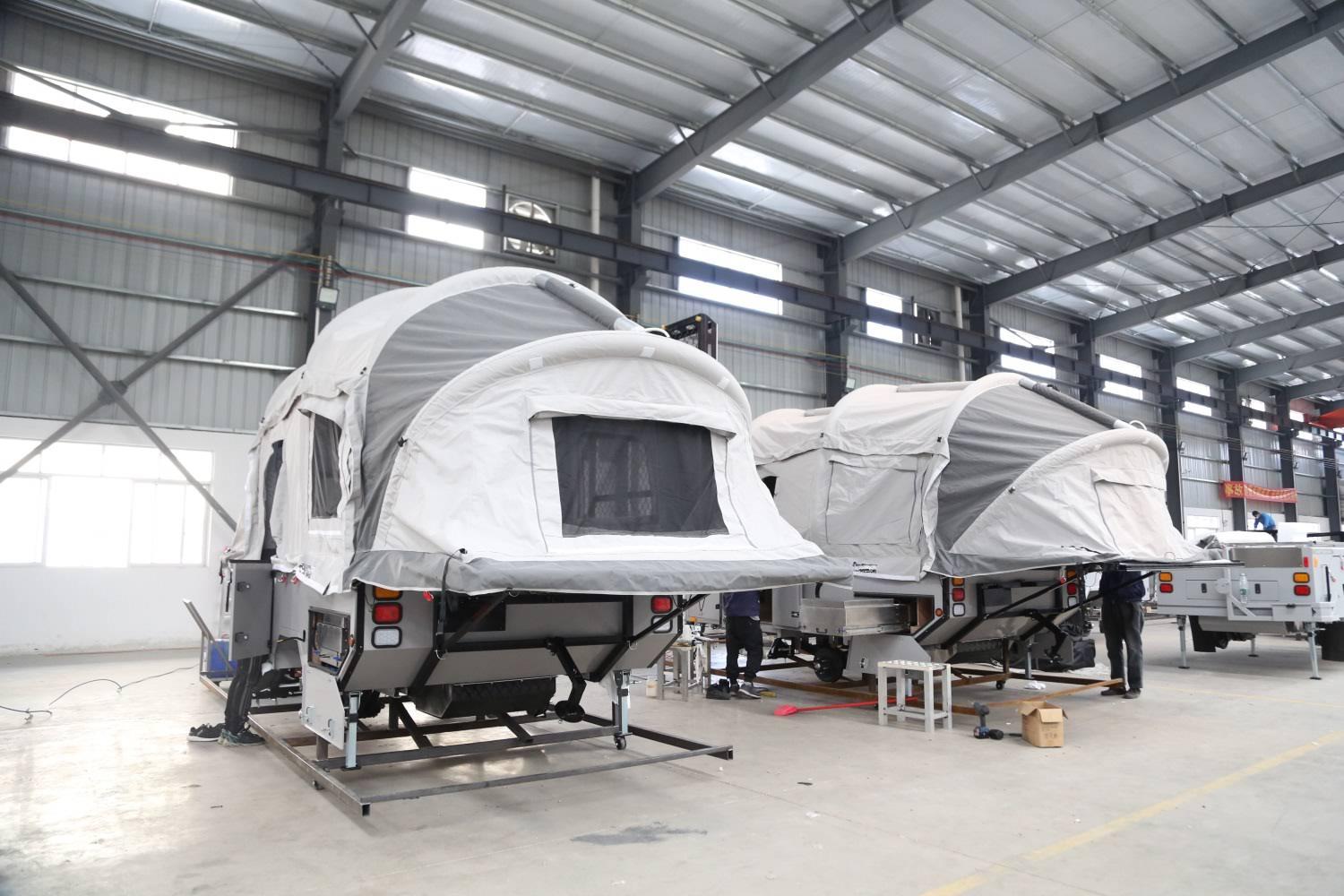What to Look for When Choosing a Folding Camping Trailer

Finding the right folding camping trailer is very important. It can make your camping trips fun or frustrating. You need one that suits your needs and feels strong. It should also make camping easier and more enjoyable. Whether you camp alone or with family, the trailer should keep you comfy and ready. Think about the space you need and how easy it is to pull. Also, decide which features are most important to you. A folding camping trailer isn’t just something you buy—it’s a way to improve your camping trips. Take your time and pick carefully!
Key Takeaways
Think about how many people will use the trailer. Small trailers work for one or two people. Bigger ones are better for families or groups.
Make sure your car can tow the trailer's weight. Use the 80% rule to stay safe while towing.
Pick a trailer made with strong materials and good insulation. This helps it last longer and keeps you comfy in any weather.
Check the beds and kitchen setup in the trailer. Being comfy and having useful features makes camping more fun.
Plan how much money you can spend. Remember to include costs for repairs, insurance, and storage so you're not surprised later.
Size and Weight Considerations for a Folding Camping Trailer
Group Size and Camping Needs
When picking a folding camping trailer, think about your group size. Are you camping alone, with one person, or with a group? Small trailers are great for two people. They give enough space without feeling tight. If you’re camping with family or friends, medium trailers can fit four people comfortably. Bigger trailers can sleep up to ten people, perfect for large groups.
Some trailers have bunk beds or sofas that turn into beds. These features save space and keep everyone comfy. Before buying, ask yourself: how much space do you need to enjoy your trip?
Storage and Space for Transport
Your trailer should fit your group and your gear. Think about where you’ll keep it when not camping. Do you have room in your garage or driveway? Folding camping trailers save space, but their size still matters.
Here’s a quick guide to trailer sizes:
Dimension | Typical Range |
|---|---|
Length | |
Width | 7-8.5 ft |
Height | Up to 13.5 ft |
Smaller trailers (10-20 ft) are easier to store and move. Larger ones (26-40 ft) have more features but need more space. Measure your storage area before buying.
Weight and Towing Capacity
Weight affects how easy it is to tow your trailer. Match the trailer’s weight to your vehicle’s towing ability. Here are some terms to know:
Term | Description |
|---|---|
Curb Weight | Vehicle weight with fluids but no passengers or cargo. |
Dry Weight | Trailer weight without fluids or gear. |
The most weight your vehicle can safely pull. | |
GVWR | The heaviest your trailer can be, including cargo. |
Small trailers weigh under 3,500 lbs and are easier to tow. Medium trailers weigh 3,500 to 6,000 lbs. Large trailers may need a strong truck. Check your vehicle’s manual to see what it can tow.
By knowing these details, you can pick a trailer that fits your needs and makes camping easy and fun.
Build Quality and Durability of Folding Camping Trailers

Checking Frame and Material Strength
Pick a trailer that can handle outdoor use. The frame is very important. It should be strong and dependable. Look for frames made of steel or aluminum. These materials don’t bend or crack easily, even on rough roads.
Some trailers have bolted frames that may twist under heavy loads. This can cause cracks and weaken the trailer over time. Overloading makes this worse and can damage the trailer badly. Always check the weight limits and follow them. Welded frames are often stronger and last longer.
Weather Protection and Insulation
Camping means facing all kinds of weather. Your trailer should keep you safe from rain, wind, and heat. Look for materials like treated fabrics or aluminum panels. These stop water from getting in and prevent rust or mold.
Insulation is also very important. It keeps the inside warm in winter and cool in summer. Some trailers have insulated walls and roofs, which are great for all seasons. Check the seals around windows and doors. Good seals block drafts and moisture, making camping more comfortable.
Suspension and Tire Strength
Suspension and tires affect how smoothly your trailer moves. A good suspension system absorbs bumps from rough roads. This protects your gear and makes towing easier. Tires should handle 10 to 25 percent more weight than the trailer’s maximum load. This helps with extra weight and air pressure changes.
Many trailer owners report problems with suspension, axles, and tires. To avoid these, pick a trailer with strong parts and check them often. Good suspension and tires make trips safer and more fun.
Features and Amenities to Enhance Your Camping Experience

Comfortable Sleeping Arrangements
A good night’s sleep can make or break your camping trip. When choosing a folding camping trailer, check out the sleeping options. Many trailers come with built-in beds, bunk beds, or convertible sofas. These features save space and give you flexibility. If you’re camping with family, bunk beds are a great way to keep everyone cozy without taking up too much room.
Look for mattresses that are thick and supportive. Some trailers even offer memory foam options for extra comfort. If you prefer bringing your own bedding, make sure the sleeping areas are spacious enough to fit your gear. Don’t forget to check the ventilation. Windows or roof vents near the sleeping area can keep the space cool and fresh at night.
Tip: Bring along your favorite pillows and blankets to make the trailer feel like home. A little extra comfort goes a long way!
Kitchen and Cooking Facilities
Cooking outdoors is fun, but having a functional kitchen in your trailer makes it even better. Many folding camping trailers come with built-in kitchenettes. These often include a small stove, sink, and mini-fridge. Some models even have outdoor cooking setups, so you can enjoy the fresh air while preparing meals.
When picking a trailer, think about your cooking style. Do you need a two-burner stove or just a single one? Is a microwave important to you? Check the storage space for utensils, pots, and pans. A fold-out counter or prep area can also be a lifesaver when you’re cooking for a group.
Pro Tip: Look for trailers with propane hookups or solar-powered appliances. These options make cooking easier, even in remote locations.
Storage Solutions and Organization
Staying organized on a camping trip can save you a lot of headaches. Folding camping trailers often come with clever storage solutions to keep your gear tidy. Look for built-in cabinets, under-bed storage, or overhead compartments. These spaces are perfect for stashing clothes, food, and camping essentials.
Some trailers even have exterior storage compartments. These are great for keeping bulky items like chairs, grills, or fishing gear out of the way. Before buying, think about what you’ll need to bring and whether the trailer has enough room for it all.
Note: Use storage bins or organizers to make the most of your space. Labeling them can help you find things quickly when you need them.
Additional Features like Awnings and Power Outlets
When you're out camping, the little extras can make a big difference. Features like awnings and power outlets might seem minor, but they can take your camping experience to the next level. Let’s dive into why these additions matter.
Awnings: Your Portable Shade and Shelter
Awnings are a game-changer for outdoor comfort. They provide shade on sunny days and keep you dry during light rain. Imagine sitting outside your trailer, sipping coffee, and enjoying the view without worrying about the weather. Sounds perfect, right?
Some trailers come with retractable awnings that are easy to set up. Others offer manual options that are just as effective. Look for durable materials like UV-resistant fabric. These last longer and protect you from harmful sun rays.
Tip: If you love outdoor cooking, an awning can double as a roof for your portable kitchen. It keeps your cooking area cool and dry, no matter the weather.
Power Outlets: Stay Connected and Powered Up
Power outlets in a folding camping trailer are more than just a convenience. They let you charge your devices, run small appliances, or even power up lights for a cozy evening. Whether you’re charging your phone or plugging in a coffee maker, outlets make life easier.
Some trailers include both indoor and outdoor outlets. Outdoor ones are great for string lights or powering a grill. If you plan to camp off-grid, look for trailers with solar power options or battery packs. These keep your outlets functional even when you’re far from a power source.
Pro Tip: Bring a power strip or extension cord. It helps you make the most of your outlets and keeps everything organized.
With awnings and power outlets, your trailer becomes more than just a place to sleep. It transforms into a comfortable, functional home base for all your adventures.
Towing Requirements and Vehicle Compatibility
Matching the Trailer to Your Vehicle’s Towing Capacity
Before you hit the road, it’s crucial to ensure your vehicle can handle the weight of your folding camping trailer. Every vehicle has a towing capacity, which is the maximum weight it can safely tow. Exceeding this limit can lead to dangerous situations. To stay safe, follow the 80% towing rule. This means you should only tow up to 80% of your vehicle’s towing capacity. For example, if your SUV can tow 5,000 lbs, aim for a trailer that weighs no more than 4,000 lbs when fully loaded.
Here’s a quick guide to towing capacities by vehicle class:
Vehicle Class | Towing Capacity (lbs) | Tongue Weight (lbs) |
|---|---|---|
Class II (e.g., Crossover) | Up to 3,500 | 350 |
Class IV (e.g., Full-size) | Up to 10,000 | 1,000 |
Class V (e.g., Heavy-duty) | Up to 20,000 | 2,000 |
Understanding these numbers helps you pick a trailer that matches your vehicle’s capabilities. Don’t forget to consider the tongue weight, which is the force your trailer places on the hitch. Ideally, this should be 10-15% of the trailer’s total weight.
Choosing the Right Hitch and Accessories
The right hitch makes towing safer and easier. There are several types to choose from, including receiver hitches, weight distribution hitches, and fifth-wheel hitches. For heavier trailers, a weight distribution hitch (WDH) is a must. It spreads the trailer’s weight evenly across your vehicle, improving stability and reducing strain on the rear axle.
If you’re towing with a heavy-duty truck or full-size SUV, you’ll benefit from their body-on-frame design. This structure provides a solid foundation for towing and enhances stability. Don’t forget to check your tires. They play a big role in keeping your trailer steady, especially when paired with a WDH.
Maneuverability and Ease of Towing
Towing a trailer shouldn’t feel like a chore. Smaller trailers, like teardrop models, are easier to maneuver and work well with sedans or small SUVs. Larger trailers require more skill and are best suited for full-size SUVs or trucks. The length of your trailer also affects how easy it is to tow. A general rule is that every 100mm of wheelbase allows for an extra foot of trailer length.
Pay attention to the rear overhang, which is the distance from the rear axle to the tow ball. A long overhang can make towing less stable and lead to issues like swaying. Practice driving with your trailer in an open area before heading out on your trip. This helps you get comfortable with turning, reversing, and braking.
Tip: Always double-check your hitch connections and trailer lights before starting your journey. Safety first!
Budget and Total Cost of Ownership
Setting a Realistic Budget for a Folding Camping Trailer
Before buying a folding camping trailer, plan your budget carefully. Trailers have different prices, from cheap ones to expensive models. Most trailers cost between $35,000 and $300,000. Prices depend on size, materials, and features. If it’s your first trailer, start with a smaller, cheaper option.
Think about how often you’ll use the trailer. Choose features that matter most to you. If you camp often, spending more on a strong trailer can save money later. RV trips can save families up to 60% compared to regular vacations. Owning a trailer can be fun and save money.
Tip: Remember to include costs like insurance, registration, and storage fees in your budget.
Comparing New vs. Used Trailers
Deciding between new and used trailers takes careful thought. New trailers have the latest features and warranties but cost more. Used trailers are cheaper and still work well if cared for properly.
Check used trailers closely for problems like rust, leaks, or worn tires. Some trailers come with inspection reports to show their condition. Buying used can help you save money while getting a good trailer.
Pro Tip: When buying used, ask for maintenance records and test everything before paying.
Planning for Maintenance and Repairs
Owning a folding camping trailer means paying for repairs and upkeep. Repairs without a warranty usually cost about $416 each time. Experts suggest saving $500 to $1,000 for unexpected fixes. Regular checks on tires, brakes, and seals can stop big problems later.
Other costs include fuel, insurance, and yearly registration fees. Planning for these helps avoid surprises. First-time trailer owners should know these costs to stay within budget.
Note: Spending on maintenance keeps your trailer safe and ready for fun trips.
Picking the best folding camping trailer depends on a few things: size, weight, strength, features, towing ability, and cost. Think about what you need for your camping trips. Do you want more sleeping space or a lighter trailer that’s easier to tow? Take time to research and compare choices.
Here’s a simple guide to common trailer types:
Camper Type | Usual Sizes | Best For | Popular Models |
|---|---|---|---|
Towable Travel Trailers | 18-30 feet | Big SUVs, trucks | Airstream Trade Wind, Grand Design Imagine |
Fifth-Wheel Trailers | 20-40 feet | Strong trucks | Keystone Montana, Grand Design Solitude |
Teardrop Trailers | N/A | Small SUVs, crossovers | nuCamp TAB 320, Little Guy Mini Max |
Pop-Up Campers | N/A | Midsize SUVs, minivans | Forest River Rockwood, Coachmen Clipper |
Toy Haulers | N/A | Large trucks | Heartland Torque, Grand Design Momentum |
Tip: Try out the trailer before buying or ask an expert for advice. Being ready makes a big difference!
FAQ
What is a folding camping trailer, and how does it work?
A folding camping trailer is a small camper you can tow. It folds down to make storage and travel easier. At the campsite, unfold it for a cozy living space. It’s great for people who want easy camping and mobility.
Can I tow a folding camping trailer with a small SUV?
Yes, many folding camping trailers are light enough for small SUVs. Check your SUV’s towing limit in the manual. Make sure the trailer’s weight, including gear, stays within that limit for safe towing.
Tip: Follow the 80% towing rule to avoid overloading your SUV.
Are folding camping trailers suitable for winter camping?
Some folding camping trailers work well for winter trips. Look for ones with insulated walls, sealed windows, and heaters. These features keep you warm and comfortable in cold weather.
How much maintenance does a folding camping trailer need?
You’ll need to check tires, brakes, and seals often. Clean the outside and look for rust or damage after trips. Save $500–$1,000 each year for unexpected repairs. Regular care keeps your trailer in good condition.
Note: Store your trailer in a dry, covered spot to avoid damage.
What’s the difference between a folding camping trailer and a pop-up camper?
Both fold up, but pop-up campers usually have soft canvas sides. Folding camping trailers often have hard panels, which are stronger and better for bad weather.
Pro Tip: Pick one based on your camping needs and weather plans.
